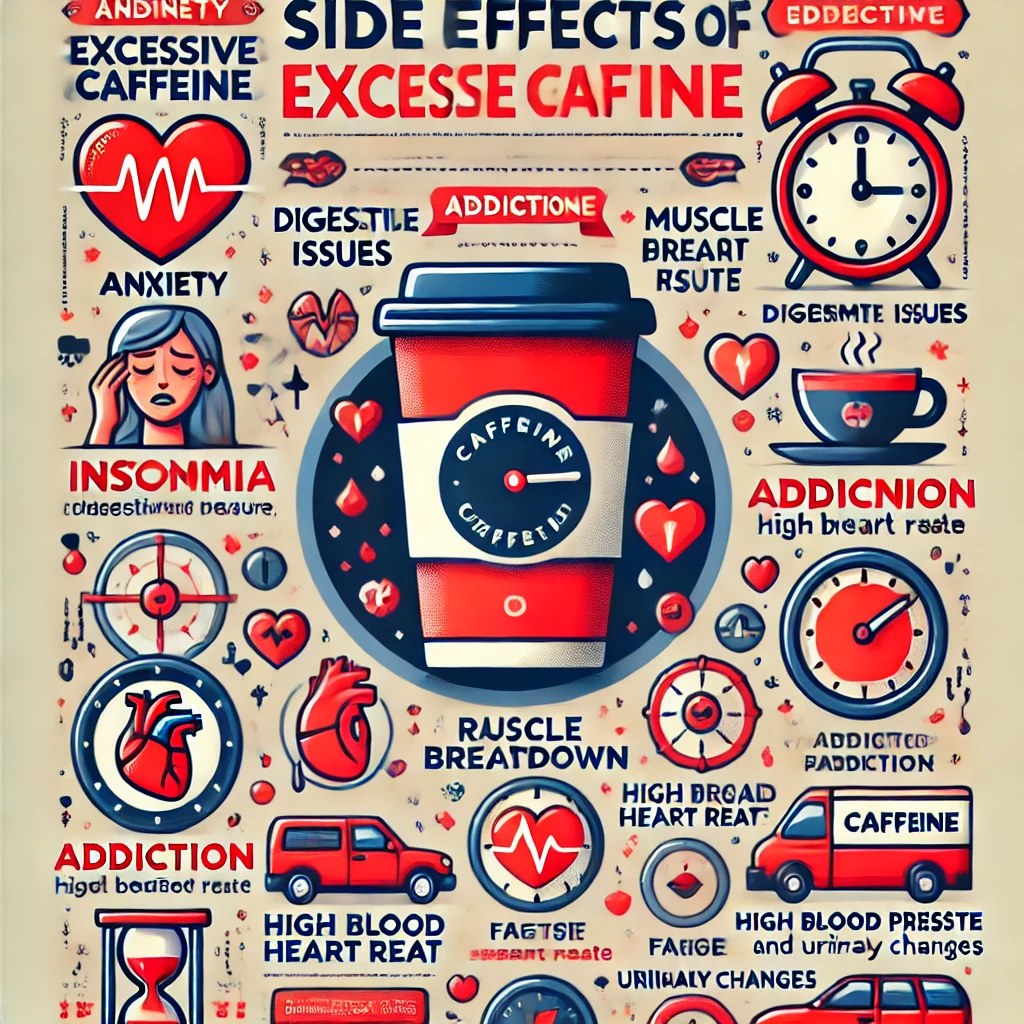
Caffeine is a common ingredient in coffee, tea, and various energy drinks. While it is generally considered safe in moderate amounts, excessive caffeine intake can result in a range of undesirable side effects. These side effects can vary from person to person, depending on individual tolerance levels. In this article, we’ll explore 9 potential side effects of too much caffeine and how to manage your consumption for optimal health.
1. Anxiety
Caffeine’s stimulating effects are one of its most well-known benefits. It increases alertness by blocking adenosine, the chemical that promotes sleepiness, and boosts the release of adrenaline, which can make you feel more energetic. However, when consumed in high doses, these effects may be intensified, potentially leading to anxiety and nervousness. Caffeine-induced anxiety disorder is recognized in the Diagnostic and Statistical Manual of Mental Disorders (DSM). If you often feel jittery or anxious, it may be helpful to monitor your caffeine intake and cut back if necessary.
2. Insomnia
While caffeine is known for its ability to keep people awake, overconsumption can lead to poor sleep quality. Research has shown that high caffeine intake can delay the time it takes to fall asleep and reduce the overall duration of sleep. To avoid sleep disturbances, it is essential to consider both the quantity and timing of caffeine consumption. For better sleep hygiene, try limiting caffeine consumption in the late afternoon and evening.
3. Digestive Issues
Many people rely on their morning cup of coffee for its bowel-stimulating effects. This occurs due to caffeine’s ability to release gastrin, a hormone that speeds up colon activity. However, excessive caffeine can lead to digestive issues such as loose stools or diarrhea. If you experience digestive distress after drinking caffeinated beverages, consider reducing your intake or switching to decaffeinated coffee or tea.
4. Muscle Breakdown (Rhabdomyolysis)
Rhabdomyolysis is a rare but serious condition where damaged muscle tissue releases substances into the bloodstream, potentially leading to kidney failure. Although uncommon, cases of rhabdomyolysis linked to excessive caffeine intake have been reported. If you engage in intense physical activity, be mindful of your caffeine consumption to reduce the risk of this severe condition.
5. Addiction
Caffeine can become habit-forming, especially if consumed in large quantities. While it does not cause the same level of dependency as drugs like cocaine or amphetamines, regular caffeine consumption can lead to both psychological and physical dependency. If you find yourself relying on caffeine to function throughout the day, consider gradually reducing your intake to avoid withdrawal symptoms.
6. High Blood Pressure
Caffeine’s stimulating effects can temporarily raise blood pressure, which may be a concern for individuals with hypertension. Studies have shown that caffeine can cause a short-term increase in blood pressure, which may strain the cardiovascular system. To minimize the impact, it’s essential to moderate your caffeine consumption, particularly if you already have high blood pressure. For more information on managing high blood pressure, visit the American Heart Association.
7. Rapid Heart Rate
Excessive caffeine intake can cause your heart to beat faster and, in some cases, lead to irregular heart rhythms like atrial fibrillation. This is particularly common among individuals consuming energy drinks containing high doses of caffeine. If you notice changes in your heart rate after consuming caffeinated beverages, it’s best to cut back and consult a healthcare professional.
8. Fatigue
While caffeine is known for boosting energy, it can paradoxically lead to increased fatigue after it leaves your system. This “rebound fatigue” occurs when the stimulating effects of caffeine wear off. Studies have shown that energy drinks may lead to increased alertness in the short term, but users often experience a crash in energy levels afterward. To avoid this, aim for moderate caffeine consumption rather than large doses.
9. Frequent Urination and Urgency
High caffeine intake can stimulate the bladder, leading to increased urination and a sense of urgency. A 2024 study observed a link between caffeine consumption and overactive bladder (OAB), showing that high tea intake can increase the risk of wet OAB. If you find yourself urinating more frequently after consuming caffeinated beverages, consider cutting back to see if symptoms improve.
The Bottom Line
While caffeine provides several health benefits, including improved mood, metabolism, and mental performance, excessive intake can lead to a range of side effects, from anxiety and insomnia to digestive issues and heart problems. It’s important to pay attention to your body’s response and adjust your caffeine consumption accordingly. To enjoy the benefits of caffeine without the unwanted side effects, aim for a balanced approach and consider reducing your intake if needed.
Leave a Reply